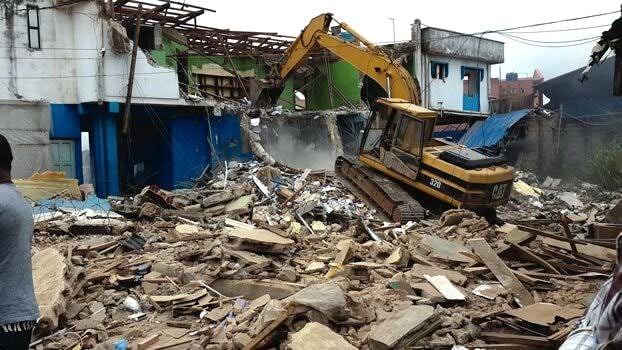For decades, Oworonshoki stood as a bustling working-class community at the Lagos end of the Third Mainland Bridge.
But in early September 2025, its skyline was transformed overnight not by development, but by destruction. On the night of Friday, September 6, bulldozers rolled in under the cover of darkness, guarded by armed escorts. By dawn, homes built in the 1970s and 80s lay in ruins. Families, many of whom claimed to have valid papers and years of tax receipts, were left stranded in the streets.
Displaced residents accused the Lagos State Government, the Lagos State Building Control Agency (LASBCA), and their traditional ruler, Oba Babatunde Saliu, of colluding in what they describe as a “midnight demolition spree.” Many alleged the demolitions were less about safety and more about land grabbing, designed to clear out low-income families and pave the way for elite real estate projects, given the area’s proximity to Lagos Island. “They told us to renovate our homes. We invested everything into upgrades, only for bulldozers to arrive weeks later,” one resident lamented. “We paid ground rents, allocation fees, and taxes for years. How can they now call us illegal occupants?”
By Monday, September 8, anger spilled onto the streets. Thousands blocked entry routes to the Third Mainland Bridge and Lagos Island, holding placards that read: “We are Lagosians too,” and “Stop land grabbing.” The protests brought traffic to a standstill, crippling one of the city’s busiest corridors. Children sat on the roads beside their parents, chanting slogans at passing motorists. Many Lagosians joined in sympathy, calling the government’s actions a betrayal of public trust.
Residents insist their monarch, Oba Saliu, misled them into costly renovations. Some say they were assured of building approvals after submitting documents even Certificates of Occupancy only to be evicted weeks later. The Kosofe LCDA Chairman, Hon. Moyosore Ogunlewe, and LASBCA officials were also accused of complicity. One affected resident alleged that even LASBCA’s General Manager initially denied knowledge of the demolition notices before pointing fingers back at the palace.
LASBCA, however, maintains it followed due process. Permanent Secretary Gbolahan Oki argued that residents ignored years of warnings and amnesty programmes, claiming many structures were unsafe. “We don’t just demolish,” Oki said. “Some of these houses were dilapidated. Just painting them cannot make them safe. Criminals on the Third Mainland Bridge also hide in nearby shanties, so demolition was necessary for security.” Yet residents remain unconvinced, insisting they never received the required statutory notices of seven, three, and one day before demolition.
Beyond the rubble lies a humanitarian crisis. Traders say businesses have collapsed, families have been torn apart, and over 10,000 households have been displaced. One trader recounted paying council levies for years, only to lose both shop and home: “We didn’t just occupy land. We paid for it. Now our livelihoods are gone.” Community leader Segun Karounwi described the demolitions as “an economic death sentence,” urging the government to provide affordable housing before displacing citizens.
Urban renewal projects across Lagos from Makoko to Badia mirror the Oworonshoki experience: the poor being cleared out to make way for development, often without resettlement plans. For planners, these demolitions are a step toward modernization. For human rights advocates, they represent a breach of dignity and international housing rights. At the heart of the conflict lies a simple but profound question: who does Lagos belong to the wealthy investors reshaping its skyline, or the ordinary people who built its communities?
Oworonshoki residents are demanding compensation for destroyed homes and businesses, transparency in demolition procedures, accountability from local leaders, and affordable housing to prevent mass homelessness. As one protester put it: “We don’t ask for luxury. We just want a roof over our heads without fear that bulldozers will return at midnight.”
The demolitions in Oworonshoki are more than a clash over land. They expose the widening rift between urban planning and human dignity, between a government bent on modernization and citizens who feel abandoned. Until that gap is bridged, the chant from Oworonshoki will echo across Lagos: “We are Lagosians too. Don’t treat us as strangers in our own home.”
Leadership



